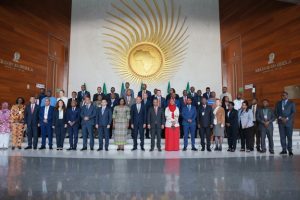BY ABEBE WOLDEGIORGIS
The Addis Ababa University Biotechnology Institute that is engaged in teaching and research focuses particularly on postgraduate program. The master’s Degree is offered to students only when they complete and submit their research outputs and get accreditation said Tiliye Feyssa, (PHD) Associate professor at Addis Ababa University, a researcher and instructor on plant biotechnology and the post graduate program associate dean at the natural science college.
The PHD students also focus on research. In addition to the biotech institute, the natural science college engages in various research works which go in line with the post graduate program.
As to Tilye, the research works aim at resolving problems which arise both nationally and internationally but prioritize on local problems. The institute has various stakeholders which utilize the research outputs as inputs for their production.
The bio technology research outputs are used in the agriculture, health and environment and industrial sectors.
Currently there are various biotechnology research works carried out in collaboration with the Ethiopian Agricultural Research Institute. Before the research works begin the problem will be identified. For example, the problem might be related with virus, fungus or bacteria which cause plant diseases.
The researches might need their own time duration that might take years. Therefore, to bring long -lasting solution preliminary work will be done before the problem surfaces.
Among the researchers conducted by the Institute are found ones conducted onfalse banana which is locally known as “enset”, on ginger a spice locally known as “zingible”.
Years back a plant disease which attacks sweet potato was identified. In collaboration with EARI the problem was solved through reproducing the crop by tissue culture method and distributing it to farmers. Other researches are also carried out but some of the end results failed to reach to the market or to the stakeholders due to weak linkage.
It is known that in our country the culture of working together is still not-well developed. Subsistence farming is the dominant feature of the agricultural sector. The situation has made the relation between researchers and farmers very weak. Their utilization capacity of research output is very limited and this in turn has made shelving the research output to be a common place.
Weak linkage is not common only in biotech but also in other endeavors of science. The department of chemistry is a case in point in this regard. It has been engaged in various researches and published the outputs which can be used as inputs for industrial production. But it has very limited access to the market or stakeholders as a result, it remains on shelf.
As to Tilye, the researchers’ mandate is only to produce their research outputs and supply it to stakeholders. They have no capacity to establish industry to do the consequent task.
To link researchers with stakeholders there is an office established which goes by the name “Vice president for Research and Technology Transfer”. The office has serves as a bridge for the research output transfer. There is also another office known as “Associate Dean for Research and Technology Transfer. ” The objectives of the establishment of the offices is to transfer the technology to industries, agriculture and environmental protection authority and other pertinent entities.
But transferring the technology to stakeholders poses its own hurdles. For example, the locally flourishing industries heavily lean on imported technologies. They do not show interest to use locally invented technologies.
There are many industrial inputs that can be produced locally which can substitute the imported one and save hard currency. The AAU chemistry department has capable researchers who invent valuable technologies. They produce essential oils and polymers which can be used as inputs in industries.
They have advanced technology and make research by their own and in collaboration with foreign researchers. But they have not scaled up their invention so as to reach stakeholders nor opened their own industry.
Even the small scale soap producers prefer to install the imported machine and use chemicals instead of using locally produced ingredients meant for the production of soap. Had they been used locally produced ingredients, it would have been helpful to the nation’s economic growth.
The expansion of science and technology is vital for the nation’s development. Copying technology might be vital but being dependent on foreign technology does not serve well for achieving sustainable socio-economic advancement. Rather it decelerates home grown technology.
Scientific research must be developed locally so that it helps to solve local problems. In this regard the link between the A AU microbiology department and the local brewery is exemplary. When the factories face problems with regard to chemical inputs they come to the department and make research in collaboration with the department and bring solutions.
There are many problems in industries that can be addressed through utilizing locally produced technologies but due to the absence of good relations research outputs are not fully utilized.
As to Tilye, research comes first tagged by the industry not the other way round but some entrepreneurs do not have sufficient knowledge in this regard.
Asked whether the Ministry of Industry or the Ministry of Science and Technology serve as a bridge to connect the researchers and the stakeholders so that utilizing the technology could be realized, Tilye the presence of an effort made by the Ministry of Science and Technology. He further said that, once up on a time, when he was instructing science, he was the science and technology technical committee chairperson and at that time he had good opportunity to meet with various stakeholders easily.
The Ministry of Science and Technology did avail 25 thousand birr to researchers but the money was not sufficient to make prolonged research which can address problems related with science. It made open announcement to offer the fund to the competent winner research. And as time passed, the amount of money was increased and efforts were made to create linkage with stakeholders but it was not effective as it was expected.
In the biotechnology institute researchers evented enzyme which serves as input for tanneries. It can be produced by large-scale level but no stakeholder shows interest to involve in large scale production.
The tannery and leather industries face shortage of enzyme and it is possible to resolve the problem by scaling up the production but unable to do so. Nevertheless, there is still high demand of the product by the factories.
There are also problems in some parts of the research work. They need due attention. Many researchers perform their work for long but in the meantime they would be interrupted due to lack of materials used as inputs which are not locally produced.
The researcher or the university has no license to import the materials and the mandate is given to the licensed traders. To the importers it is not feasible to import some of the materials unless it is in gross which again makes getting the materials difficult. As the result, the research works end up unfulfilling their objectives.
The enzyme produced in the laboratory will be patented and filed. Stakeholders can use the product through renting the patent or by being shareholders.But no one dares to involve in such venture.
In the country where business networking has flourished, as soon as the researchers invent technology, companies purchase the patent or buy the mutual benefit agreement utilizing the product. Therefore, to fill the gap promoting the culture of business networking should continue.
The Ethiopian Herald January 14/2022




